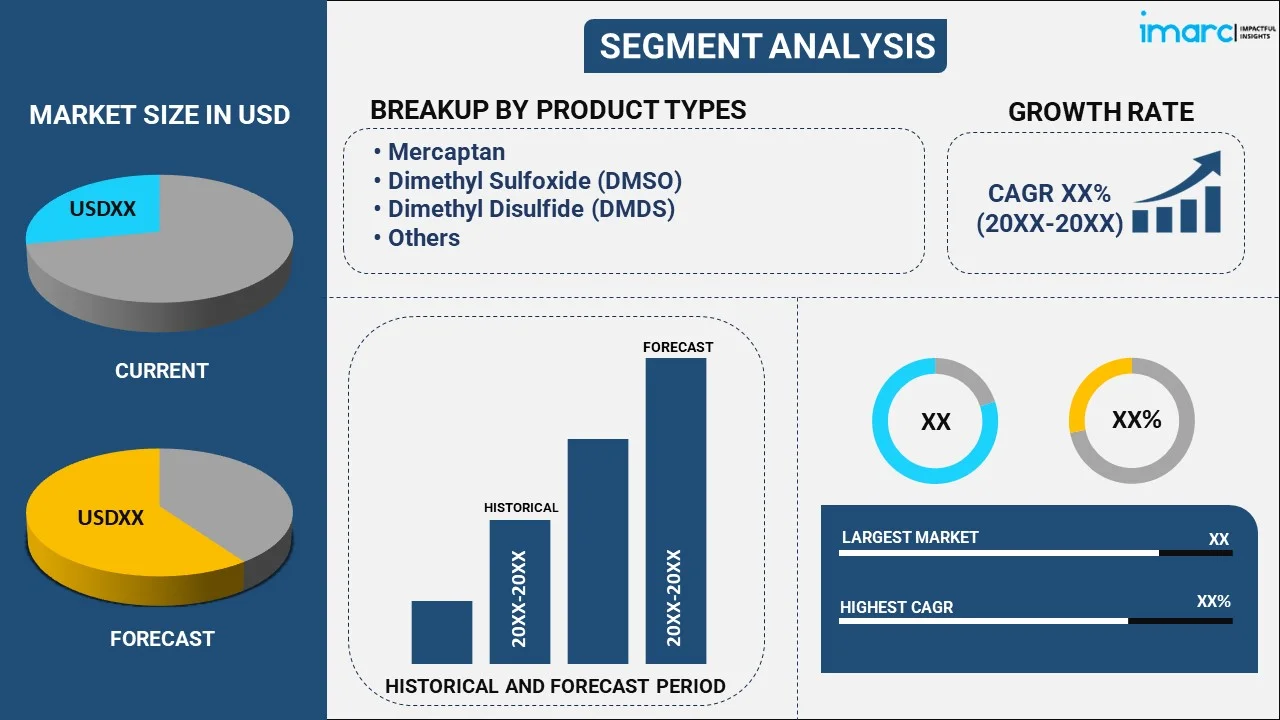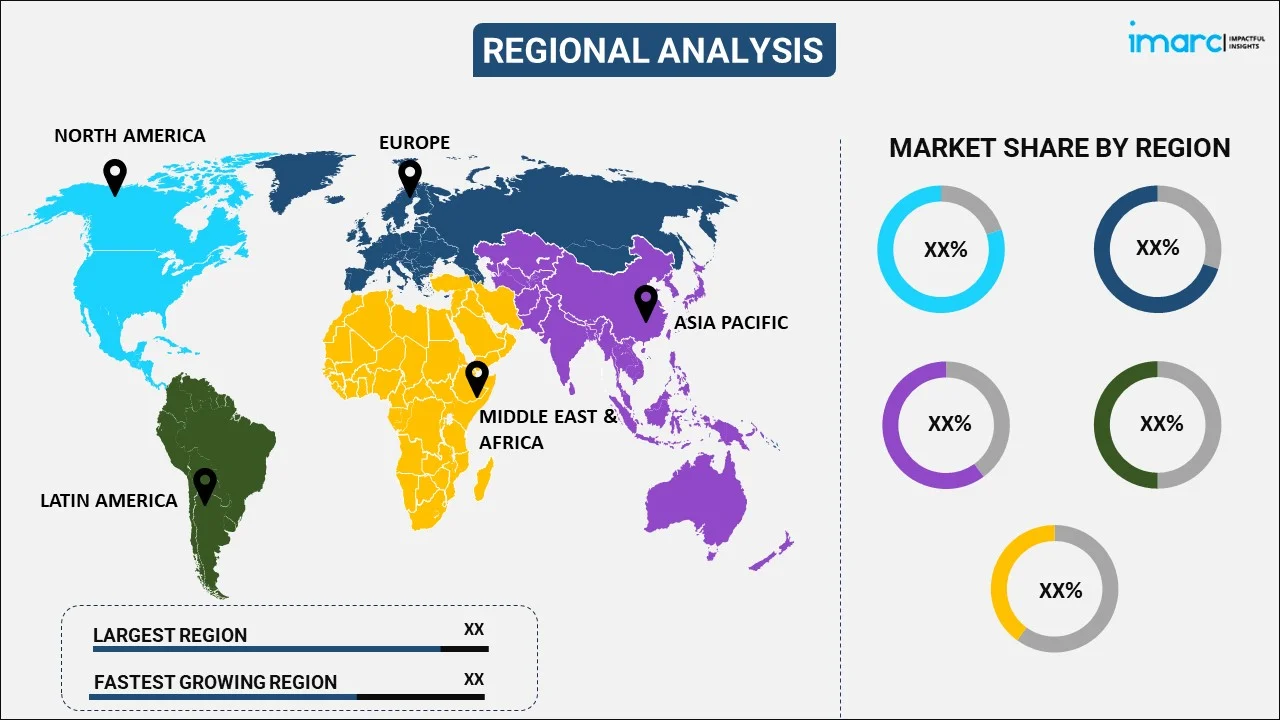
Thiochemicals Market Report by Product Type (Mercaptan, Dimethyl Sulfoxide (DMSO), Dimethyl Disulfide (DMDS), Thioglycolic Acid and Ester, Thiourea, and Others), Application (Animal Nutrition, Oil and Gas, Polymers and Chemicals, Food and Agrochemicals, Automotive and Transportation, Consumer Goods, Plastics, and Others), and Region 2025-2033
Market Overview:
The global thiochemicals market size reached USD 1,145.1 Million in 2024. Looking forward, IMARC Group expects the market to reach USD 1,703.5 Million by 2033, exhibiting a growth rate (CAGR) of 4.51% during 2025-2033. The growing role in wastewater treatment, increasing applications in the production of various drugs and active pharmaceutical ingredients (APIs), and rising use in personal care products, particularly in hair removal and hair treatment formulations, are some of the factors driving the market demand.
|
Report Attribute
|
Key Statistics
|
|---|---|
|
Base Year
|
2024
|
|
Forecast Years
|
2025-2033
|
|
Historical Years
|
2019-2024
|
|
Market Size in 2024
|
USD 1,145.1 Million |
|
Market Forecast in 2033
|
USD 1,703.5 Million |
| Market Growth Rate 2025-2033 | 4.51% |
Thiochemicals refer to a set of chemicals, wherein the oxygen molecules present in the compound are replaced by sulfur ions through thitation or thionation reaction. They consist of mercaptans or methanethiols, which are extensively used as an odorant for desulfurization and natural gas leakage detection purposes. Apart from this, theochemical compounds are further employed to produce methyl mercaptans and utilized as an anti-cocking and polymerization agent in the polymer industry. On account of these properties, thiochemicals find extensive applications across several industrial verticals. At present, they are commercially available in varying types, such as dimethyl, sulfoxide, thioglycolic acid and ester. The thiochemicals market share is experiencing growth due to increasing demand across various industries, advancements in production technologies, and a focus on sustainable applications.
Thiochemicals Market Trends:
Increasing Use in Wastewater Treatment
Thiochemicals play a vital role in wastewater treatment by helping to remove heavy metals and neutralize harmful substances, ensuring cleaner effluents. In industrial processes, wastewater often contains toxic heavy metals like lead, mercury, and cadmium, which can be hazardous to the environment and human health if not properly treated. Thiochemicals, such as thiols and sulfur-based compounds, react with these metals to form insoluble metal sulfides, which can then be easily filtered out. This process helps to prevent the contamination of water bodies with dangerous metals. In regions, where compliance with environmental standards is stringent, thiochemicals are becoming vital for companies seeking to reduce their ecological footprint. This rise in industrial wastewater treatment projects is driving the demand for thiochemicals. For example, in 2024, Thermax announced the opening of a new wastewater treatment facility in Pune. Spread over two acres, the facility integrates advanced production techniques and automation to improve efficiency and minimize waste. This aligns with Thermax's mission to conserve resources and promote sustainable water management solutions.
Growing Role in Pharmaceuticals
Thiochemicals are crucial intermediates in the production of various drugs and active pharmaceutical ingredients (APIs). Their sulfur-containing structure is vital in the synthesis of complex compounds needed for medications, particularly antibiotics, anti-inflammatory drugs, and cancer treatments. Sulfur atoms within thiochemicals enhance the reactivity and biological activity of these compounds, making them essential in creating effective pharmaceuticals. In antibiotic production, thiochemicals help form sulfur-based functional groups that combat bacterial infections. Additionally, they are used in the synthesis of anti-inflammatory drugs to reduce pain and inflammation in patients. In cancer treatments, sulfur-containing thiochemicals are involved in producing targeted therapies that attack cancer cells. The rising healthcare expenditures and the increasing prevalence of noncommunicable diseases (NCDs) among the masses is driving demand for thiochemicals. Based on the data provided by the World Health Organization (WHO) in 2023, 41 million deaths occur annually because of NCDs making up 74% of all deaths worldwide. Cardiovascular diseases are responsible for the most NCD deaths, with 17.9 million every year, then cancers (9.3 million), chronic respiratory diseases (4.1 million), and diabetes (2.0 million, including deaths from diabetes-related kidney disease).
Rising Demand in Cosmetics and Personal Care Products
Thioglycolic acid, a prominent thiochemical, is widely used in personal care products, particularly in hair removal and hair treatment formulations. Its sulfur-containing structure allows it to break down the disulfide bonds in hair keratin, effectively weakening the hair structure. This makes it an essential ingredient in depilatories, where it helps dissolve hair at the surface of the skin, facilitating easy removal. Additionally, thioglycolic acid is used in hair treatments like perm solutions and relaxers, where it helps reshape the hair by altering its natural structure, providing desired styling effects. The ability of the chemical to modify hair bonds without causing excessive damage to the scalp or skin makes it highly effective in cosmetic applications. People are increasingly seeking grooming and beauty solutions, leading to higher usage of thiochemicals in these formulations. In 2023, the worldwide market size for beauty and personal care products amounted to US$ 506.2 Billion, as per the data provided by the IMARC Group.
Key Market Segmentation:
IMARC Group provides an analysis of the key trends in each segment of the global thiochemicals market report, along with forecasts at the global, regional and country levels from 2025-2033. Our report has categorized the market based on product type and application.
Breakup by Product Type:

- Mercaptan
- Dimethyl Sulfoxide (DMSO)
- Dimethyl Disulfide (DMDS)
- Thioglycolic Acid and Ester
- Thiourea
- Others
Breakup by Application:
- Animal Nutrition
- Oil and Gas
- Polymers and Chemicals
- Food and Agrochemicals
- Automotive and Transportation
- Consumer Goods
- Plastics
- Others
Breakup by Region:

- North America
- United States
- Canada
- Asia-Pacific
- China
- Japan
- India
- South Korea
- Australia
- Indonesia
- Others
- Europe
- Germany
- France
- United Kingdom
- Italy
- Spain
- Russia
- Others
- Latin America
- Brazil
- Mexico
- Others
- Middle East and Africa
Competitive Landscape:
The report has also provided a comprehensive analysis of the competitive landscape in the global thiochemicals market. Detailed profiles of all major companies have also been provided. Some of the companies covered include:
- Affon Chemical Co., Ltd.
- Arkema
- Bruno Bock GmbH
- Chevron Phillips Chemical Company LLC
- Hebei Yanuo Bioscience Group Co., Ltd.
- Huhhot Guangxin Chemical Trade Co., Ltd.
- KIP Chemicals
- Merck KGaA
- Shinya Chem
Kindly note that this only represents a partial list of companies, and the complete list has been provided in the report.
Thiochemicals Market News:
- January 2023: Evonik revealed plans to establish a new methyl mercaptan manufacturing facility in Mobile, Alabama, by 2024. This plant was created to manufacture methyl mercaptan, an important compound used in producing DL-methionine, essential for animal feed.
Thiochemicals Market Report Coverage:
| Report Features | Details |
|---|---|
| Base Year of the Analysis | 2024 |
| Historical Period | 2019-2024 |
| Forecast Period | 2025-2033 |
| Units | Million USD |
| Segment Coverage | Product Type, Application, Region |
| Region Covered | Asia Pacific, Europe, North America, Latin America, Middle East and Africa |
| Countries Covered | United States, Canada, Germany, France, United Kingdom, Italy, Spain, Russia, China, Japan, India, South Korea, Australia, Indonesia, Brazil, Mexico |
| Companies Covered | Affon Chemical Co., Ltd., Arkema, Bruno Bock GmbH, Chevron Phillips Chemical Company LLC, Hebei Yanuo Bioscience Group Co., Ltd., Huhhot Guangxin Chemical Trade Co., Ltd., KIP Chemicals, Merck KGaA, Shinya Chem, etc. |
| Customization Scope | 10% Free Customization |
| Post-Sale Analyst Support | 10-12 Weeks |
| Delivery Format | PDF and Excel through Email (We can also provide the editable version of the report in PPT/Word format on special request) |
Key Questions Answered in This Report
The global thiochemicals market was valued at USD 1,145.1 Million in 2024.
We expect the global thiochemicals market to exhibit a CAGR of 4.51% during 2025-2033.
The rising need for animal feed to improve poultry health and fuel the production of numerous agricultural and animal-based products, such as eggs, milk, veal, chicken, etc., is primarily driving the global thiochemicals market.
The sudden outbreak of the COVID-19 pandemic had led to the implementation of stringent lockdown regulations across several nations, resulting in a temporary halt in the production activities for thiochemicals.
Based on the product type, the global thiochemicals market has been segregated into mercaptan, Dimethyl Sulfoxide (DMSO), Dimethyl Disulfide (DMDS), thioglycolic acid and ester, thiourea, and others. Among these, mercaptan currently holds the largest market share.
Based on the application, the global thiochemicals market can be bifurcated into animal nutrition, oil and gas, polymers and chemicals, food and agrochemicals, automotive and transportation, consumer goods, plastics, and others. Currently, animal nutrition exhibits clear dominance in the market.
On a regional level, the market has been classified into North America, Asia-Pacific, Europe, Latin America, and Middle East and Africa, where Asia-Pacific currently dominates the global market.
Some of the major players in the global thiochemicals market include Affon Chemical Co., Ltd., Arkema, Bruno Bock GmbH, Chevron Phillips Chemical Company LLC, Hebei Yanuo Bioscience Group Co., Ltd., Huhhot Guangxin Chemical Trade Co., Ltd., KIP Chemicals, Merck KGaA, and Shinya Chem.
Need more help?
- Speak to our experienced analysts for insights on the current market scenarios.
- Include additional segments and countries to customize the report as per your requirement.
- Gain an unparalleled competitive advantage in your domain by understanding how to utilize the report and positively impacting your operations and revenue.
- For further assistance, please connect with our analysts.
 Request Customization
Request Customization
 Speak to an Analyst
Speak to an Analyst
 Request Brochure
Request Brochure
 Inquire Before Buying
Inquire Before Buying




.webp)




.webp)












